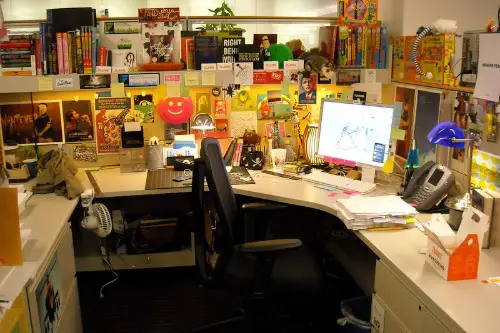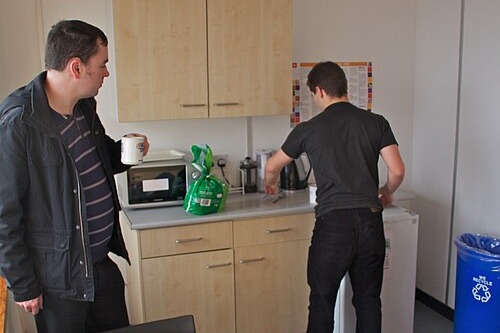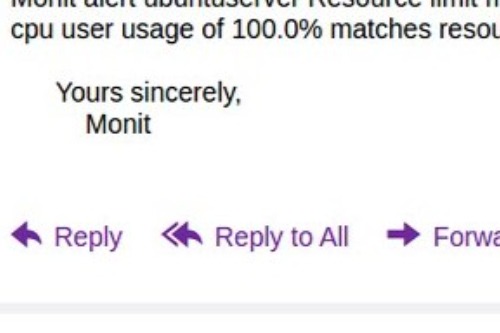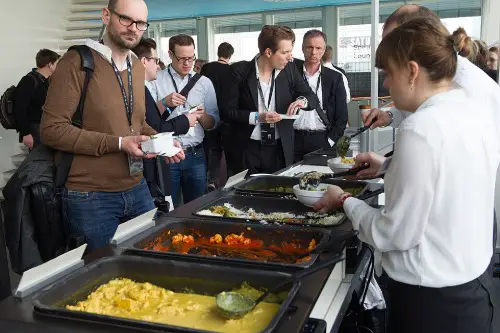1. Desk Décor Is a Personality Test

Your desk is more than a workspace—it’s a curated exhibit of who you are (or want to be). Family photos say “I’m grounded,” while a quirky mug says “I’m fun but responsible.” Too much clutter? You’re disorganized. Too clean? You’re cold.
You learn to strike the right balance—personal but professional, expressive but not distracting. It’s office feng shui with a side of self-branding. And yes, that one coworker with the lava lamp is definitely making a statement.
2. The Kitchen Is a Passive-Aggressive War Zone

The office kitchen is where manners go to die—leftovers are stolen, dishes are abandoned, and passive-aggressive notes multiply like mold in the fridge. You learn quickly that labeling your lunch is a survival tactic, not paranoia. And if you microwave fish? You’re basically declaring war.
There’s an unspoken code about fridge space, coffee etiquette, and who’s responsible for cleaning the communal sponge (spoiler: no one). It’s a shared space that reveals everyone’s true character. And somehow, it’s always out of paper towels. Always.
3. The “How Was Your Weekend?” Ritual Is Mandatory

Every Monday morning, like clockwork, someone will ask, “How was your weekend?” It’s not really about the answer—it’s a social cue, a ritual that signals we’re all back in the grind together. You’re expected to give a brief, upbeat summary, even if you did absolutely nothing. It’s less about bonding and more about reestablishing the rhythm of office life.
Skip this exchange and you risk being labeled cold or antisocial. It’s a small talk handshake, and it matters more than you think. You don’t have to be interesting—you just have to participate. And yes, everyone knows you didn’t really “just relax.”
4. “Let’s Circle Back” Means “I’m Not Doing This Now”

Corporate speak is its own language, and phrases like “let’s circle back” or “put a pin in it” are code for “this isn’t happening anytime soon.” It sounds polite, but it’s really a soft no. You learn to read between the lines—and to use the same phrases when you want to dodge something without seeming uncooperative.
It’s diplomacy in spreadsheet form. Everyone knows what it means, but no one says it out loud. And if someone says “great question,” they’re definitely buying time. Welcome to the verbal chess match of office life.
5. The Birthday Card Hustle Is Real

There’s always a birthday card circulating, and you’re expected to sign it—even if you barely know the person. You’ll spend five minutes trying to come up with something more original than “Have a great day!” while pretending you’re not just copying what the last person wrote. And if you forget to sign? You’re the office grinch.
It’s a small gesture with outsized social weight. You’re not just signing a card—you’re signaling that you’re a team player. Bonus points if you throw in a smiley face. Double bonus if you remember their dog’s name.
6. The Elevator Is a Silent Zone—Except for Small Talk

There’s a strange rule in American offices: the elevator is both a place of silence and forced politeness. You nod, maybe say “morning,” and then stare at the numbers like they’re fascinating. But if someone breaks the silence with weather talk, you’re obligated to respond.
It’s a delicate dance of social cues. Too much conversation feels invasive, but total silence feels cold. So you land somewhere in the middle—pleasant, forgettable, and just awkward enough to feel like work. And yes, everyone’s pretending not to notice the elevator smell.
7. The “Reply All” Button Is a Weapon

Nothing unites an office like someone misusing “Reply All.” It’s the fastest way to become infamous—and the slowest way to get anything done. You learn quickly to double-check your recipients, especially when venting or joking. One wrong click, and you’re the subject of whispered hallway gossip for weeks.
There’s an unspoken hierarchy of email etiquette, and violating it is social suicide. Keep it short, keep it relevant, and for the love of HR, don’t hit “Reply All” to say “Thanks!” It’s not just annoying—it’s a breach of the peace.
8. Lunch Is a Political Act

Where you eat lunch—and with whom—says more than you think. Eating at your desk signals you’re busy (or antisocial). Joining the same group every day means you’ve picked a side. And eating alone in the break room? That’s a statement, too.
You learn to navigate the lunch landscape like a diplomat. Sometimes you eat with the team to build rapport. Other times, you hide in your car just to get a break. Either way, it’s never just about the food.
9. Saying “Let Me Know If You Need Anything” Means “Please Don’t”

This phrase is office code for “I’m being polite, but I really hope you don’t follow up.” It’s a social nicety that sounds helpful but sets no actual expectations. You’re offering support without committing to anything. And everyone knows it.
It’s not dishonest—it’s just efficient. You’re signaling goodwill while protecting your bandwidth. And if someone actually does reach out? You’re allowed to be mildly surprised. That’s the game.
This post 9 Social Rules That Only Make Sense If You’ve Worked in an American Office was first published on American Charm.


